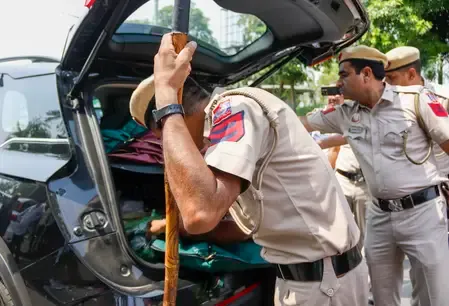How Did Pickpockets Steal a Phone and Create a Fake UPI ID to Defraud Rs 7.2 Lakh?

Synopsis
Key Takeaways
- Three individuals arrested for pickpocketing and fraud.
- Victim's phone was stolen on a bus.
- Fraudulent withdrawals totaled Rs 7.2 lakh.
- Fake UPI ID was created using the victim's Aadhaar details.
- Police are pursuing three additional suspects.
New Delhi, June 19 (NationPress) In a significant breakthrough, the Delhi Police apprehended three individuals from a pickpocketing and cyber fraud syndicate responsible for stealing a mobile phone on a city bus. They subsequently embezzled over Rs 7.2 lakh by fabricating a fraudulent UPI ID using the victim's Aadhaar details, all while planning a pilgrimage to Dehradun, Haridwar, and Kedarnath.
The incident occurred on May 24, as the victim, Sukhbir Singh, was on his way back home aboard bus number 835.
His phone was taken by a group of thieves. Alarmingly, just four days later, he discovered that Rs 7.2 lakh had been illicitly withdrawn from his three bank accounts.
An e-FIR was filed at PS Najafgarh under Section 303(2) of the BNS.
The investigation revealed that the perpetrators accessed an image of the victim’s Aadhaar card stored in the stolen phone, using it to create a forged UPI ID linked to the victim's bank accounts.
The criminals executed multiple transactions using the three linked accounts and a mobile number traced to a suspect named Shyam Kumar, which led the police to Shashank (26), who resides in Dehradun.
According to the Delhi Police, the accused made trips to Dehradun, Haridwar, and Kedarnath with the money fraudulently withdrawn from the victim's accounts.
Further questioning of Shashank resulted in the arrest of several accomplices - Janu, Ritesh, Kartikay - and ultimately Aman (25) from Mohan Garden and Prince Yadav (20) from Nangloi, Delhi, identified as the primary pickpockets.
A team led by Inspector Subhash Chand under ACP Mahesh Narayan tracked the suspects across the national capital, Uttar Pradesh, and Uttarakhand before capturing the three primary accused.
Three additional suspects – Danny, Ritik, and Sumit – are still at large. The arrested individuals have admitted to their involvement in the crime during interrogation. The police have recovered vital digital evidence and are continuing their efforts to apprehend the remaining suspects.
Ankit Singh, IPS, DCP Dwarka district, confirmed the arrests and assured that a thorough investigation is ongoing in this case.





